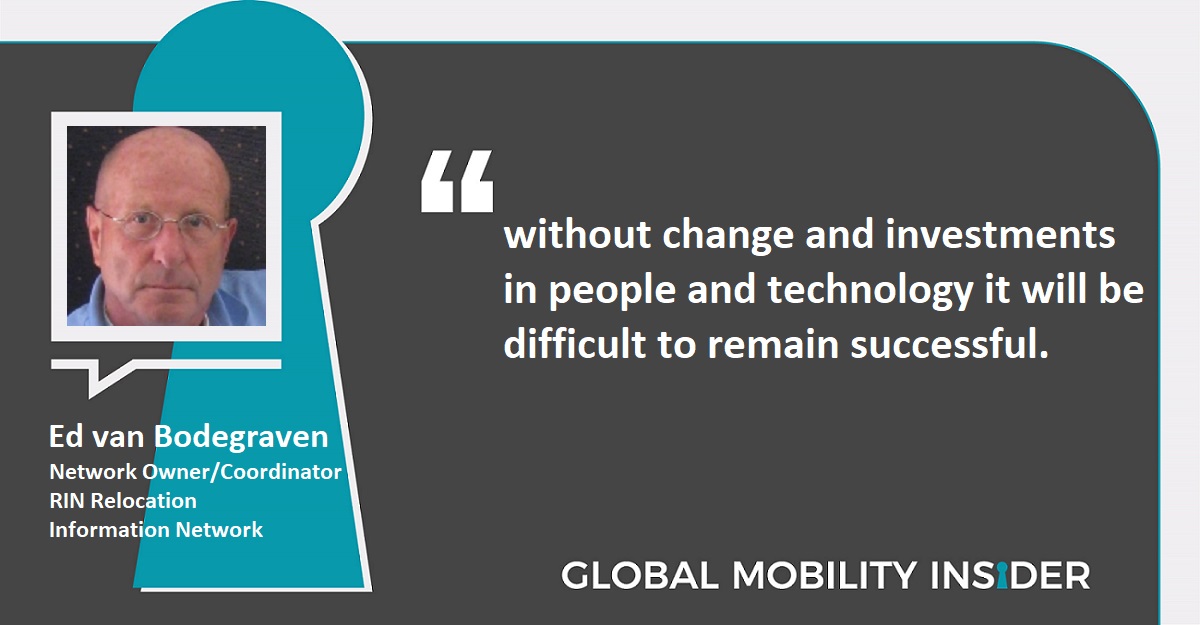Ed van Bodegraven - Network Owner/Coordinator - RIN Relocation Information Network
Name: Ed van Bodegraven
Position: Network Owner/Coordinator
Company: RIN Relocation Information Network
Professional Background
RIN Relocation Information Network, Network Owner/Coordinator (Netherlands): 1995 – Present
Voerman Group, Commercial Management (Netherlands): 1986 – 2012
Steens International, Sales Executive (Netherlands): 1973 – 1985
Interdean, Customer support (Netherlands & Belgium) 1967 - 1973
Career Insider
Q: Why global mobility, and how did you get started in the industry?
A: Coming from the airline business, I was introduced to the international moving industry by a business colleague, who recommended me to the Interdean Group. I spent a few months in their offices in Zurich and Geneva, where I received my basic training. From the very first moment I got hooked to the international working environment and the unique dynamics of global mobility.
Click & Like on LinkedIn
Q: What is 'business as usual' like for you at RIN Relocation Information Network?
A: Managing and running the RIN network is more a hobby than work for me. I am a workaholic and the last thing I can handle is an empty agenda. Especially during the last few years, the RIN Network is going through a stage of healthy development, with new initiatives and a growing number of meetings. As a result, we see an increasing number of registered participants from many well-known multinational companies, who appreciate the fact that RIN is not created as a money maker but as a place to safely share knowledge and experience, without a commercial thread.
There is also a growing interest from international suppliers to contribute, which shows that RIN has become a recognized network for in-house mobility professionals.
Q: What are you proud of achieving in your career and what's next?
A: This industry has given me the chance to explore the world, become a world citizen, experience many cultures, and meet many people from all around the world and make friends with many like-minded colleagues, for which I am grateful.
I am proud of having kept up a solid and trustworthy business reputation, which still works for me and the RIN network and which will help me in my challenge to make RIN a major player in the world of international mobility. One of my challenges is finding the right likeminded people in other countries, who see the opportunities in running a RIN Chapter in their region and dare to invest time and energy in the RIN concept.
Industry Insider
Q: How do you think the global mobility industry has changed over the years?
A: The global mobility industry has gone through many changes in a relatively short period of time. When I started my career in the mobility industry, it was far from where it is right now.
At that time, we did not see full service relocation providers and expats were expected to do a lot of the work themselves, without professional help. I have seen the mobility industry mature from a side business for financial and operational companies into a specialized service industry
As for the future, we see a drastic change in the type of expat from long-term to short-term assignees. This creates a much different playing field, with an increasing number of transfers. Corporate clients expect an often much more complicated service package from their mobility providers. Consequently, the mobility industry must hire highly educated staff and it needs to make costly investments in IT solutions and more creative service packages. New developments, such as block chain technology and an increasing digitization, will become more and more important and require a high level of intelligence.
Unfortunately, the relocation industry is still a rather unknown area for many people, who are not directly involved in the international mobility world. This makes it extra difficult to attract high level staff into our business, especially in a growing economy, where quality people tend to look for jobs that appeal more to their expectations.
Q: What aspect of global mobility is likely to keep you up at night?
A: There are plenty of aspects in this business to keep me up at night but what still strikes me most of all is often the position of the individual employee in the entire mobility process.
An expat is more than a piece of equipment that you can shift from point A to point B. There often seems to be a lack of understanding and emotional intelligence with decision makers. In their price negotiations and their decision about the right provider, they do not always seem to realize that they are not only responsible for the expat but also for his/her family, with its own specific questions, expectations and emotions. This simply requires more knowledge about the impacts of selecting a provider that does not meet the necessary quality criteria.
Q: What is the most important strategic tip you can give to companies handling global mobility?
A: Make sure that you really know what is happening in the mobility market. Watch developments and try to understand what the market will need in 5 to 10 years. Invest time in finding out what your present and future clients really care about and what they really know about the mobility market. Educate your client about possibilities and risks. Don’t expect that they know. Try to level with them and help them to understand how you can jointly work out their mobility strategy. Try to determine what products and services will make you successful. Make the difference!
Keep in mind that without change and investments in people and technology it will be difficult to remain successful.
Visionary Insider
Q: How can global mobility practices get better in the next 5 years?
A: Many corporate accounts have cut down on their in-house mobility staff and, as a result, they expect the expat to be much more flexible.
Modern up-to-date IT and software packages are getting more and more popular and can generate a smooth and economic relocation process for the modern expat. Nevertheless, the individual remains important and we cannot just generalize in our approach to the market and only offer online services and apps. Providers must offer the right mix to accommodate the various levels of corporate clients, which will always have different expectation levels. This requires a high level of emotional experience from well-educated staff. Investments in ongoing training are essential and will show the difference in quality, continuity and growth.
Q: What more can be done to improve current global mobility practices to benefit talents on the move?
A: Invest in a smooth working environment that leaves sufficient time to focus on the individual client. Make sure that the relocation process is not only focused on making money but on the well-being of the expat and his/her family. Manage expectations in a time of stress with compassion for the people that, we as service providers, have the responsibility for.
Either/Or…
- Short-term or long-term assignment? Short-term assignments
- Airbnb or serviced apartments? Serviced apartments
- Excel or global mobility software? Global mobility software
- Lump-sum or flex-ben? Flex-ben
- Facebook or LinkedIn? LinkedIn
- Outlook or Gmail? Outlook
- Taxi or Uber? Taxi
- iOS or Android? IOS
- Mac or PC? PC
- Computer or tablet? Computer
- Work hard or play hard? Both



Leave a Comment
* Fields marked with this asterisk are mandatory.